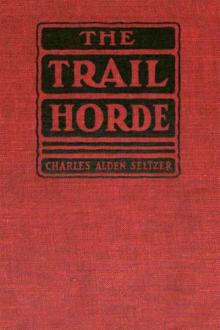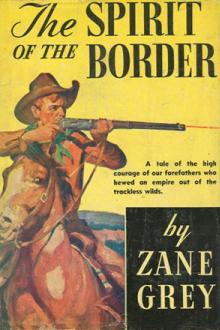The Border Legion, Zane Grey [books for 7th graders txt] 📗

- Author: Zane Grey
Book online «The Border Legion, Zane Grey [books for 7th graders txt] 📗». Author Zane Grey
“That would have been better for you..... Joan, I'll do this. Marry you honestly and leave the country. I've gold. I'm young. I love you. I intend to have you. And I'll begin life over again. What do you say?”
“Say? I'd die before—I'd marry you!” she panted.
“All right, Joan Randle,” he replied, bitterly. “For a moment I saw a ghost. My old dead better self!... It's gone.... And you stay with me.”
7
After dark Kells had his men build a fire before the open side of the cabin. He lay propped up on blankets and his saddle, while the others lounged or sat in a half-circle in the light, facing him.
Joan drew her blankets into a corner where the shadows were thick and she could see without being seen. She wondered how she would ever sleep near all these wild men—if she could ever sleep again. Yet she seemed more curious and wakeful than frightened. She had no way to explain it, but she felt the fact that her presence in the camp had a subtle influence, at once restraining and exciting. So she looked out upon the scene with wide-open eyes.
And she received more strongly than ever an impression of wildness. Even the camp-fire seemed to burn wildly; it did not glow and sputter and pale and brighten and sing like an honest camp-fire. It blazed in red, fierce, hurried flames, wild to consume the logs. It cast a baleful and sinister color upon the hard faces there. Then the blackness of the enveloping night was pitchy, without any bold outline of cañon wall or companionship of stars. The coyotes were out in force and from all around came their wild sharp barks. The wind rose and mourned weirdly through the balsams.
But it was in the men that Joan felt mostly that element of wildness. Kells lay with his ghastly face clear in the play of the moving flare of light. It was an intelligent, keen, strong face, but evil. Evil power stood out in the lines, in the strange eyes, stranger then ever, now in shadow; and it seemed once more the face of an alert, listening, implacable man, with wild projects in mind, driving him to the doom he meant for others. Pearce's red face shone redder in that ruddy light. It was hard, lean, almost fleshless, a red mask stretched over a grinning skull. The one they called Frenchy was little, dark, small-featured, with piercing gimlet-like eyes, and a mouth ready to gush forth hate and violence. The next two were not particularly individualized by any striking aspect, merely looking border ruffians after the type of Bill and Halloway. But Gulden, who sat at the end of the half-circle, was an object that Joan could scarcely bring her gaze to study. Somehow her first glance at him put into her mind a strange idea—that she was a woman and therefore of all creatures or things in the world the farthest removed from him. She looked away, and found her gaze returning, fascinated, as if she were a bird and he a snake. The man was of huge frame, a giant whose every move suggested the acme of physical power. He was an animal—a gorilla with a shock of light instead of black hair, of pale instead of black skin. His features might have been hewn and hammered out with coarse, dull, broken chisels. And upon his face, in the lines and cords, in the huge caverns where his eyes hid, and in the huge gash that held strong, white fangs, had been stamped by nature and by life a terrible ferocity. Here was a man or a monster in whose presence Joan felt that she would rather be dead. He did not smoke; he did not indulge in the coarse, good-natured raillery, he sat there like a huge engine of destruction that needed no rest, but was forced to rest because of weaker attachments. On the other hand, he was not sullen or brooding. It was that he did not seem to think.
Kells had been rapidly gaining strength since the extraction of the bullet, and it was evident that his interest was growing proportionately. He asked questions and received most of his replies from Red Pearce. Joan did not listen attentively at first, but presently she regretted that she had not. She gathered that Kells's fame as the master bandit of the whole gold region of Idaho, Nevada, and northeastern California was a fame that he loved as much as the gold he stole. Joan sensed, through the replies of these men and their attitude toward Kells, that his power was supreme. He ruled the robbers and ruffians in his bands, and evidently they were scattered from Bannack to Lewiston and all along the border. He had power, likewise, over the border hawks not directly under his leadership. During the weeks of his enforced stay in the cañon there had been a cessation of operations—the nature of which Joan merely guessed—and a gradual accumulation of idle wailing men in the main camp. Also she gathered, but vaguely, that though Kells had supreme power, the organization he desired was yet far from being consummated. He showed thoughtfulness and irritation by turns, and it was the subject of gold that drew his intensest interest.
“Reckon you figgered right, Jack,” said Red Pearce, and paused as if before a long talk, while he refilled his pipe. “Sooner or later there'll be the biggest gold strike ever made in the West. Wagon-trains are met every day comin' across from Salt Lake. Prospectors are workin' in hordes down from Bannack. All the gulches an' valleys in the Bear Mountains have their camps. Surface gold everywhere an' easy to get where there's water. But there's diggin's all over. No big strike yet. It's bound to come sooner or later. An' then when the news hits the main-traveled roads an' reaches back into the mountains there's goin' to be a rush that'll make '49 an' '51 look sick. What do you say, Bate?”
“Shore will,” replied a grizzled individual whom Kells had called Bate Wood. He was not so young as his companions, more sober, less wild, and slower of speech. “I saw both '49 and '51. Them was days! But I'm agreein' with Red. There shore will be hell on this Idaho border sooner or later. I've been a prospector, though I never hankered after the hard work of diggin' gold. Gold is hard to dig, easy to lose, an' easy to get from some other feller. I see the signs of a comin' strike somewhere in this region. Mebbe it's on now. There's thousands of prospectors in twos an' threes an' groups, out in the hills all over. They ain't a-goin' to tell when they do make a strike. But the gold must be brought out. An' gold is heavy. It ain't easy hid. Thet's how strikes are discovered. I shore reckon thet this year will beat '49 an' '51. An' fer two reasons. There's a steady stream of broken an' disappointed gold-seekers back-trailin' from California. There's a bigger stream of hopeful an' crazy fortune hunters travelin' in from the East. Then there's the wimmen an' gamblers an' such thet hang on. An' last the men thet the war is drivin' out here. Whenever an' wherever these streams meet, if there's a big gold strike, there'll be the hellishest time the world ever saw!”
“Boys,” said Kells, with a ring in his weak voice, “it'll be a harvest for my Border Legion.”
“Fer what?” queried Bate Wood, curiously.
All the others except Gulden turned inquiring and interested faces toward the bandit.
“The Border Legion,” replied Kells.





Comments (0)